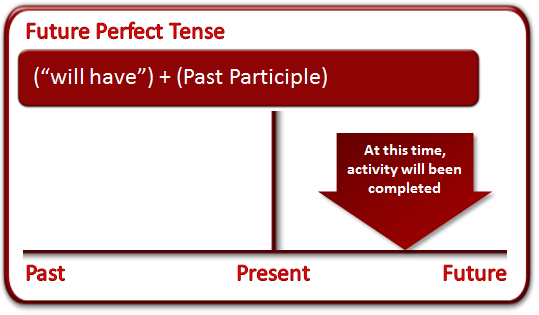
Future Perfect Tense is an easy tense to understand. We use it to talk about the past in the future or about something that will be over in the future.
In the above example picture, Harry is thinking of a future time (14.00 this afternoon). At 14.00, he will be able to say “My flight will have landed”.
How to make the Future Perfect Tense?
The structure of Future Perfect Tense is:
- Positive: Subject + will have + Past Participle
- Negative: Subject + will not have + Past Participle
- Question: Will + Subject + have + Past Participle
| Subject | Auxiliary | Auxiliary | Verb | |||
| + | My flight | will | have | landed | by 14.00 this afternoon. | |
| + | You | will | have | forgotten | me by then | |
| – | She | will | not | have | gone | to school |
| – | We | will | not | have | left | |
| ? | Will | you | have | arrive? | ||
| ? | Will | they | have | received | the letter? |
Contraction
In speaking with the future perfect tense, we often contract the subject and will. Sometimes, we contract the subject, will and have all together:
I will have = I’ll have
You will have = You’ll have
We will have = We’ll have
They will have = They’ll have
He will have = He’ll have
She will have = She’ll have
It will have = It’ll have
How to use the Future Perfect Tense?
The future perfect tense expresses action in the future before another action in the future. This is the past in the future.
For example:
- The train will leave the station at 9am. You will arrive at the station at 9.15am. When you arrive, the train will have left.
Look at some more examples:
- You can call me at work at 8am. I will have arrived at the office by 8.
- They will be tired when they arrive. They will not have slept for a long time.
- “Mary won’t be at home when you arrive.”
“Really? Where will she have gone?”
You can sometimes think of the future perfect tense like the present perfect tense, but instead of your viewpoint being in the present, it is in the future.

Great English Grammar